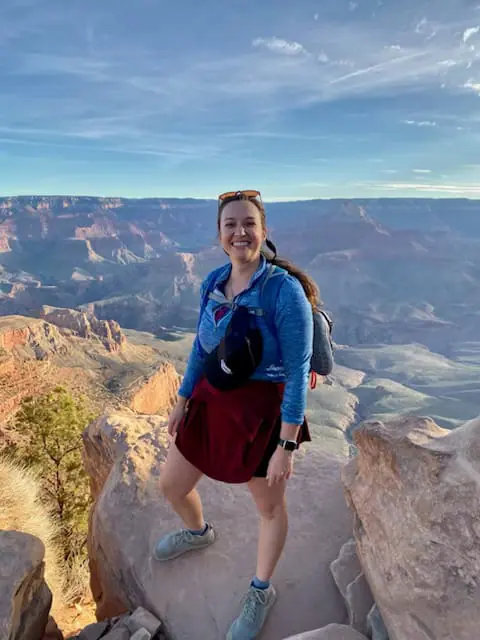In this series, we’re meeting with Swette Center team members to explore their background in food systems, what they are currently working on, and their vision of food systems transformation.
Read on for an interview with Rylie Lewis, Research Specialist.

When did you first get interested in food systems work?
I've always loved food, and my family is deeply involved in agriculture, so I've been immersed in farming my whole life and have gained a firsthand understanding of where our food comes from. Growing up, my mom always had a garden she was planting in, and my dad worked in agriculture education with a high school program involving crops and livestock. My grandparents are from Eastern Arizona, where they grew up on farms and helped grow cotton. My other grandparents had a small farm and grew sweet corn and we would often hop on his tractor, ride through the fields, and help harvest. I also have an uncle who ran a dairy farm where we helped with the cows, chasing them around and taking care of the calves. That's what got me most interested in food systems. It even drove me to study microbiology in college, which really helped prepare me for a career in this field by allowing me to better understand living things and their interactions.
What are you working on currently?
Prior to coming to the Swette Center a few months ago, I worked for a company developing soil amendments and spent a year in agriculture education. This skill-set has come in handy for many projects at the Swette Center. Currently, I'm helping with Arizona TOPP (Transition to Organic Partnership Program), USDA NextGen, and a new continuing education program for dietitians—all of these incorporate education to diverse audiences such as producers, educators, students, and industry partners. Thankfully, I have a pretty good connection to Arizona agriculture and knowledge specific to the local area, which is helping me with promotional strategies.
What do you think is a priority in transforming food systems?
Considering my background in microbiology, I believe a key priority in transforming food systems should be advancing the use of biological inputs (i.e., living soil amendments, biocontrols, beneficial microbes) in agriculture. This field holds significant potential for innovation and growth to offer sustainable alternatives to bolster food production. As we work to create an agricultural system that promotes soil health while maintaining high yields and supporting the livelihoods of farmers, tools like biological inputs will play a critical role.
Any advice for current food systems students?
Just have an open mind. As a student, you might come in with predetermined opinions about food systems, but agriculture is a really diverse space with lots of intricacies and opportunities to explore. I find it very interesting that we originally started with traditional agricultural practices, then industrialized it, and now we’re seeing organic and sustainability gaining popularity. You never know where it’s going next.
Technology will play into this as well, especially because it’s growing so fast. With the emergence of technology like drones and AI, and increasing knowledge about genetics in living things, remember to keep an open mind about what could be the best option and benefit the most people. Everyone has differing opinions, but these changes are coming, so we have to be able to adapt.
What is your favorite food to make?
Probably cookies—I loved cookies growing up! My family always had cookie ingredients in the house, and someone was always making a fresh batch. They just bring joy, so I think they’re probably the thing I've made the most. Everybody has their own version too; every family has a cookie recipe that they swear is the best. Now that my family has grown up and my siblings have gotten married, we’ve gotten to have new cookies introduced as well. I’m never gonna complain about a cookie!